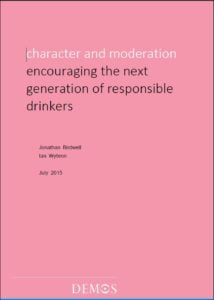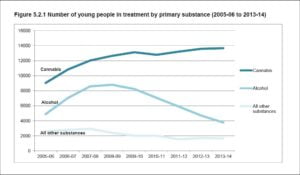Alcohol less important to young people
An intriguing recent (15 July 2015) report from the Demos think tank: Character and moderation: encouraging the next generation of responsible drinkers examines the recent phenomenon of young people drinking much less alcohol than previous generations.
Demos commissioned a nationally representative survey of young people aged 16 to 24 years old with very similar findings to recent official data (see my recent post on reductions in binge drinking).
The survey found that:
- The majority of young people (66%) do not consider alcohol to be important to their social life;
- Many (41%) of those who do drink believe alcohol is more important to their parents’ social lives and to their own;
- Almost one fifth (19%) young people say they do not drink at all;
- Only 3% of those who do drink said alcohol was an essential part of socialising for them.
The main reason that young people gave for drinking less was an increased awareness of the health consequences of alcohol use.
[divider]
Character and moderation
Perhaps the most interesting part of the report looks at the links between “character” and “moderation”. Demos’ use of the word character is connected with receiving good parenting and seems to be made up of a range of skills and attributes including, in particular, the following “non-cognitive skills”:
- Self-perceptions of ability: beliefs in one’s own ability to accomplish a task or goal;
- Motivation: underlying beliefs about why to accomplish a goal;
- Perseverance: grit and steadfastness in putting forth the necessary behaviour to accomplish a goal;
- Self-control: resisting short-term impulses in order to prioritise a higher pursuit;
- Meta-cognitive strategies: knowledge about and control over one’s own cognitive system;
- Social competencies: leadership and socio-emotional skills which reflect positive skills that allow one to get along with others;
- Resilience: ability to succeed despite significant challenge, including problem-solving and optimistic thinking used to manage stressful situations; and
- Creativity: the creation of original and novel ideas.
It’s not hard to see that young people who feel secure and confident are more likely to possess these skills and, consequently, be more able to moderate their intake of alcohol and other substances.
[divider]
Recommendations
It is perhaps because of this very broad conclusion which can be characterised as “good parenting leads to emotionally healthy children who tend to make sensible life decisions” that Demos’ ten recommendations are, to my mind, rather woolly and not particularly likely to be implemented by government – and even less so in this age of austerity.
Here are the recommendations:
- The next Government should provide a comprehensive early intervention
 strategy as part of its strategy to tackle alcohol misuse.
strategy as part of its strategy to tackle alcohol misuse. - The government should continue to target resources at the home environment and support for parents, particularly those in vulnerable situations, through increased investment in Family Nurse Partnerships.
- The size of public health budgets that local authorities receive from national government should be linked to alcohol harm profiles.
- There should be better joined up working between government departments with current responsibility for alcohol (Home Office, Department for Health, Public Health England), the Department for Education and the Cabinet Office.
- Public Health England needs to work with local authorities and the Department for Education to ensure that ‘life skills’ programmes in schools are considered an important component of public health strategies at a local level.
- Public Health England should invest in research to understand what is causing the sustained decline in youth drinking.
- The Department for Education should ensure that teacher training colleges are teaching best practice pedagogical approaches to ensure that teachers adopt teaching strategies that evidence shows are more likely to build character in their pupils.
- Personal, Social and Health Education (PSHE) should be part of the national curriculum and schools need to be incentivised to adopt a ‘whole school’ approach to character development.
- Local alcohol partnerships should be strengthened to curb underage drinking – working with schools and public health workers – and should continue to promote diversionary activities and innovations such as non-drinking pubs for young people.
- The alcohol industry should look at ways to engage positively with national campaigns aimed at building character skills and healthy lifestyle choices amongst young people.
Please let me know via the comments section below if you think I’m being unduly cynical.






2 Responses
Not overly cynical at all. As per coverage of this on http://www.alcoholpolicy.net:
‘Certainly the recommendations of improving life-skills and character based approaches can be considered in line with the evidence base for early year intervention approaches to prevent later life drug and alcohol misuse. However other recommendations within the report, particularly those advocating the role of the alcohol industry, will not find favour with many public health roles, especially without recognition of the influence of price, availability or advertising.’
I.e the second most cited reason for drinking less amongst young people (55%) was ‘being less able to afford alcohol compared to 10 years ago ‘. Price is a very significant determinant in consumption as we know, yet gets no mention in the recommendations.
May also be worth noting Demos’ alcohol work is funded by.. SabMiller.
Thanks for your comment James. Certainly, the recent Alcohol Concern study found that price and marketing have a big influence on the preferences of young people who seek treatment for alcohol misuse: http://test18.russellwebster.com/price-and-marketing-determine-what-alcohol-young-people-drink/